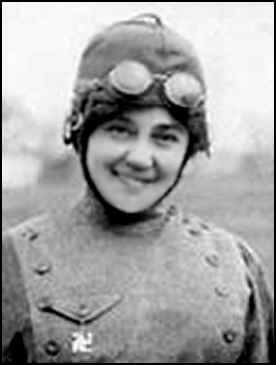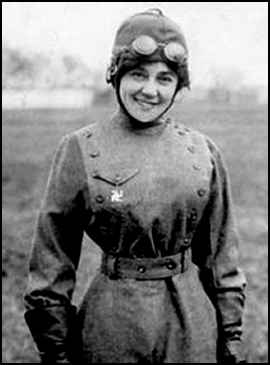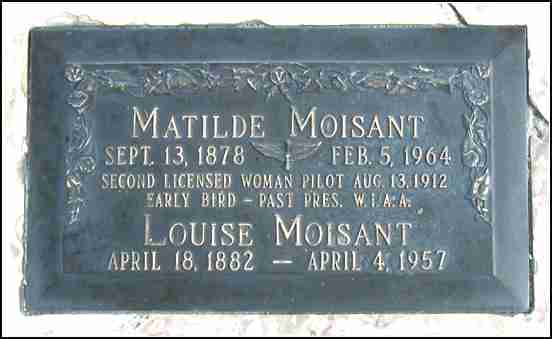

1878-1964 |
 |
 |
Wearing a Swastika good luck charm from Hill Air Force Base Collection via Wikipedia |
|
|
|
Perils of Pauline by Steve Remington While you are there, I heartily recommend that you take time to visit the main CollectAir site. To start your visit, just click on: |
|
|
|
|
|
AVIATION Miss Matilda Moisant, sister of the late aviator, John B. Moisant, recently made a flight at Hempstead, N. Y., in her monoplane and attained a height of nearly 2,500 feet. This is the greatest altitude ever reached by a woman aviator. The flight was made in a puffy wind and Miss Moisant displayed remarkable skill in handling her machine. Miss Nellie Beese, a sculptress, qualified for a pilot's license September 8th and gained the distinction of being the first aviatress in Germany. A new record was made for a continuous flight by a woman when Helene Dutrieux covered 136.62 miles thus winning the woman's cup, offered for the longest continous flight made by a woman aviator, in the present year. The record was formerly held by Jane H. Herveux, who covered 63 miles. |
|
by Matilde Moisant from Colliers Magazine 30 September 1911 Transcribed by Dave Lam, 1-9-04 The fog episode was fine after it was over, but for a moment I thought that I was going to have a very bad spill. The air was pretty thick, and before I went up I looked around very carefully to see if there were any other machines off the ground. It seemed to me that I counted all of our school machines either in their hangars or in front of one, and so I determined to emulate my brother's example and found that if I maintained an altitude of about 300 feet I could distinguish objects on the ground sufficiently well to insure my landing accurately and safely. in flying across country in a fog. I got up all right, and found that if I maintained an altitude of about 300 feet I could distinguish objects on the ground sufficiently well to insure my landing accurately and safely. Therefore, I swung around in large circles for nine or ten minutes, and was enjoying the sensation immensely because the air was not too cold and the moisture did not interfere seriously with my comfort. Having exhausted the possibilities of the moment, it seemed that a landing was about due, so I turned my machine toward the ground, cut out the motor, and started on a glide which, it appeared to me, carry me right up to the hangar enclosure. Just as I did so it was fortunate for me that my motor was throttled down so that all other sounds came very sharp and clear. I heard the exhaust of another engine somewhere in my neighborhood, but invisible because of the fog. I estimated that the other machine was about on the same level that I was, and that it was coming toward me, so I pitched my machine a little bit more steeply. When I reached a height of about 150 feet from the ground, a biplane coming from I know not where and driven by someone whose identity I have not even yet discovered, crossed my path at right angles to and within twenty five feet of my machine. Out of danger. For an instant I was a little disconcerted, because I had heard so much of the danger of driving through the "wash" of another aeroplane. But the speed that I had gathered by gliding, assisted by the pull of my slowly revolving propeller, was sufficient to carry me back through the troubled air and I landed prettily and exactly where I had planned. But I had to think of what might have occurred had the two machines met each other on the same level, which might have happened had I not had my motor running so slowly that I could hear all the other sounds very clearly. Apparently one of the dangers of aviation, and they are comparatively few, {{note from Dave-bad copy, and I unfortunately can't read the rest of this paragraph}}. Omar speaks of "that inverted bowl we call the Sky." A strange feature of flying high is that Omar's picture is exactly reversed, and an airman poet might very properly speak of "That inverted bowl we call the Earth." It is remarkable how the ground seems to turn upward at the edges, so that the spot over which one is flying lies at the bottom of a huge hollow whose sides gradually approach the sky. |
 |
|
Matilde Moisant was born September 13, 1878, at Earl Park, Indiana. She began her flying career in an
Anzani-engined Bleriot at Mineola, Long Island, N. Y., and made her first solo flight on July 13, 1911, receiving F.A.I. Airplane Pilot's
Certificate #44, being the second woman to receive a pilot's license in the U.S.A., which was dated August 17, 1911. After receiving some
verbal instructions from her brother John Moisant, she made her very first flight, lasting 32 minutes, all alone, an official record of which was
by Aero Club of America. She learned to fly at her brother's flying school, the Moisant School of Aviation in Mineola, N.Y. John Moisant, her
brother, learned to fly at the Bleriot School of Aviation in Pau, France, then started his own school on Long Island. On September 24, 1911, Matilde Moisant flew her Bleriot monoplane to an altitude of 1200 feet over Nassau Boulevard flying field at Garden City, Long Island. Nassau County police officials tried to arrest her for flying on a Sunday over Garden City, after warning her not to fly, however she disregarded their warning and jumped the gun, taking-off regardless. Eventually the sheriff caught up with her but when he attempted to arrest her, 300 of Miss Moisant's fans came to her rescue and beat back the police in a riot that lasted more than half an hour. A later attempt by the sheriff to serve Miss Moisant with a warrant failed when the Justice of the Peace said he could see nothing wrong with flying on Sunday. Miss Moisant set a woman's altitude record over Mexico City in 1912. Matilde Moisant died on February 5, 1964 in a Glendale California Sanitarium aged 84 years. Burial was in the Portal of the Folded Wings in Valhalla Memorial Park, North Hollywood, California. |
|
Recommended Book for Further Reading: Magnificent Moisants: Champions of Early Flight Doris L. Rich Smithsonian Press, Oct., 1998 |


|